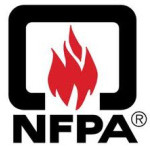- Industry: Fire safety
- Number of terms: 98780
- Number of blossaries: 0
- Company Profile:
Established in 1896, NFPA's mission is to reduce the worldwide burden of fire and other hazards on the quality of life by providing and advocating consensus codes and standards, research, training, and education.
Force that occurs when a water stream is discharged from the nozzle.
Industry:Fire safety
For the purposes of this standard, the temperature of the room in which the test is being conducted.
Industry:Fire safety
For the purposes of this standard, the rate of heat transferred per unit area to surface, typically expressed in kilowatts/m2, kilojoules/sec-m2 or Btu/sec-ft2.
Industry:Fire safety
For the purposes of this standard, the person designated by the governing body or responsible party of an historic building or structure with the duties and responsibilities of providing and ensuring fire protection for that facility or institution.
Industry:Fire safety
For the purposes of this standard, the length of time fuel is permitted to be delivered to a proved pilot before the flame-sensing device is required to detect the pilot flame.
Industry:Fire safety
For the purposes of this standard, the designation indicating the duration of the fire test exposure to which a fire door assembly or fire window assembly was exposed and for which it successfully met all acceptance criteria as determined in accordance with NFPA 252, Standard Methods of Fire Tests of Door Assemblies, or NFPA 257, Standard on Fire Test for Window and Glass Block Assemblies, respectively.
Industry:Fire safety
For the purposes of this standard, instrument air is air intended for the powering of medical devices unrelated to human respiration (e.g., surgical tools, ceiling arms). Medical air and instrument air are distinct systems for mutually exclusive applications. Instrument air is a medical support gas that falls under the general requirements for medical gases.
Industry:Fire safety
For the purposes of this standard, containers built to DOT specification 5P (1A1).
Industry:Fire safety
For the purposes of this standard, any hydrocarbon oil as specified by ASTM D 396, Standard Specification for Fuel Oils, or CAN/CGSB 3. 2-99(2), Heating Fuel Oil, and having a minimum flash point of 100°F (38°C).
Industry:Fire safety
